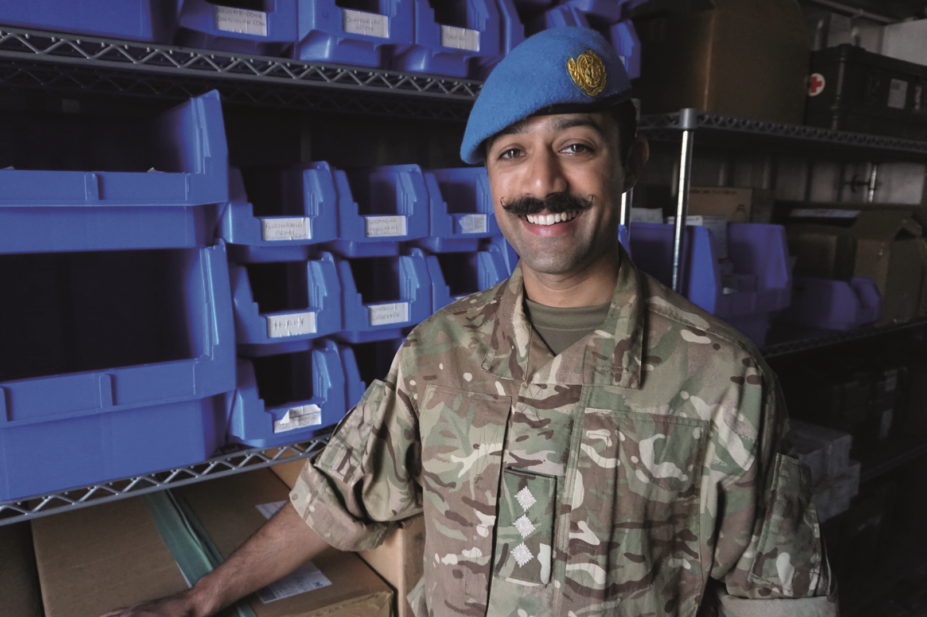
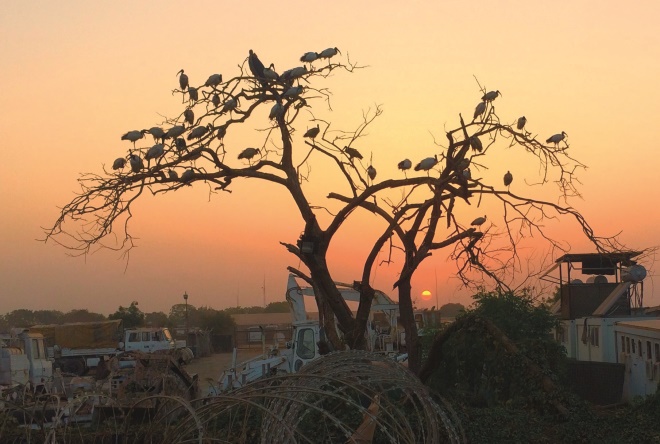
Source: Courtesy of Anuj Sunder
Army Reserve pharmacist, Anuj K. Sunder shares details of his four-month deployment to South Sudan as part of a United Nations Humanitarian Operation.
A rare gust of wind picks up, coating me in a fine layer of dust. Dressed in a towel, I look back at the wash room and wonder why I had taken the effort to even shower. A business of mongoose startle me as I make my way back to my room — they are becoming comfortable with our presence which by no accounts is a good thing. After donning my uniform, I take the walk down to the dining facility. En route the environmental health officer informs me of another encounter with a black mamba, this time in the guard room. The tannoy goes off: “Pharmacist to ITU [intensive therapy unit] at the rush”. Welcome to South Sudan.
After gaining independence in 2011, South Sudan imploded on itself within a few years. The cultural and political conflict resulted in a mass migration of civilians. The United Nations Mission in South Sudan (UNMISS) was set up with the aim to protect civilians, monitor human rights and deliver humanitarian aid. Our Level 2 Hospital had a primary role of providing medical infrastructure and support in a resource limited environment to the UK task force, troop contributing countries and local workers. The overall priorities during this humanitarian crisis have been sanitation, security, food with the prevention of communicable disease and vector borne disease all rolled into one.
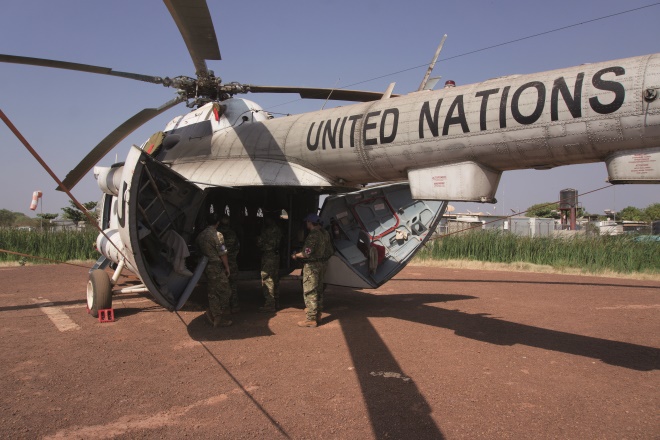
Source: Courtesy of Anuj Sunder
Pre-deployment training occurred in various locations in the UK and consisted of both theory and practical aspects. This ranged from live firing of both the service pistol and rifle, to a clinical lecture series at the Army Medical Services Training Centre (AMSTC) in York. Here, training in a ‘mock’ hospital where our collaborative efforts in ongoing secondary care scenarios were tested. As a pharmacist my main role was leading on medicines management, working alongside a Royal Navy pharmacy technician. My personal approach to this operation was to see it as a unique opportunity in my career and to give it my all.
On arriving in the capital Juba, the relentless heat averaging 36°C was very unforgiving. I found myself very much drained of energy in the first few days which unfortunately, was my handover period. Seated in my tented pharmacy department, temperatures averaged 46°C where I relied on having to catch sweat drops before they ruined my controlled drugs register. In addition, water was at a premium. We were allowed one ‘ship’ shower per day only, restricted to 1 minute 15 seconds of running water time.
The biggest risk to service personnel in South Sudan is vector borne disease which included leishmaniasis as well as malaria. Risk was mitigated by promoting the use of DEET repellent and the wearing of long sleeves after 1900 hours. The pharmacy technician and I conducted an audit and found that although antimalarial drug compliance was very good overall, roughly 20% of the taskforce did not know what action to take if they missed a dose by 24 hours – some service personnel choosing to double dose. My role therefore involved education and training to the taskforce prior to the commencement of the rainy season where the malaria risk peaks.
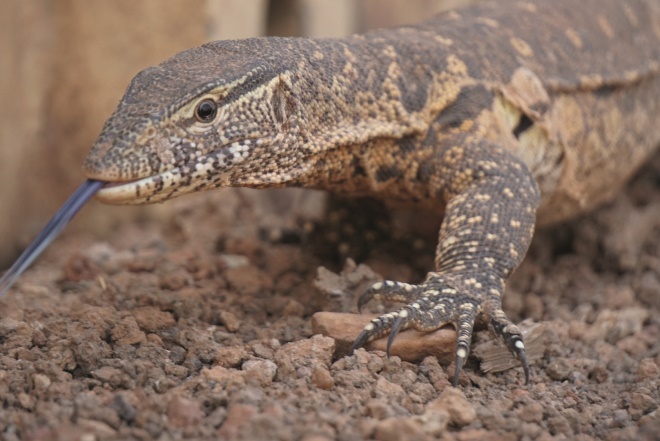
Source: Courtesy of Anuj Sunder
Other wildlife risks included the presence of Africanised honey bees, packs of wild dogs, venomous snakes, spiders and scorpions. My role involved ensuring that a sufficient stock of rabies vaccine and immunoglobulin were maintained as well as snake anti-venoms.
Pharmacy medicines management services were required across both primary and secondary care. As we were largely dealing with young, fit, military personnel, musculoskeletal, gastrointestinal and dermatology issues (mosquito bites) were the most common presenting complaints in this cohort of patients. As a pharmacist, I was found to be very much part of the trauma team, in addition to the regular hospital pharmacy role, aiding the nursing team in dosing and administration queries where required.
The first intensive therapy unit case occurred three days of me arriving into theatre. It involved a 53-year-old male deteriorating with acute respiratory distress syndrome. As well as reviewing the patient’s drug chart, some of the key roles for me was to aid the aeromedical evacuation team in ensuring that they had everything they require to keep the patient intubated throughout flight as well as ensuring the paramedics were issued with oral transmucosal fentanyl lozenges for first-line battle casualty analgesia.
Although on-call 24/7, I personally used any spare time reading, drawing or exercising. Football matches were organised against the Ghanaians Force Protection Unit, and on most Saturday afternoons we played 20/20 cricket against the Indian Army. Although we had some star players, we lost quite embarrassingly in our first match, but managed to lose by only a few wickets each time as the tour went on. As I am of Indian heritage with the Punjabi language as my mother tongue, it was both interesting and fulfilling to meet the Indian Officers of HMEC, many of which lived near my father’s previous home in Punjab.
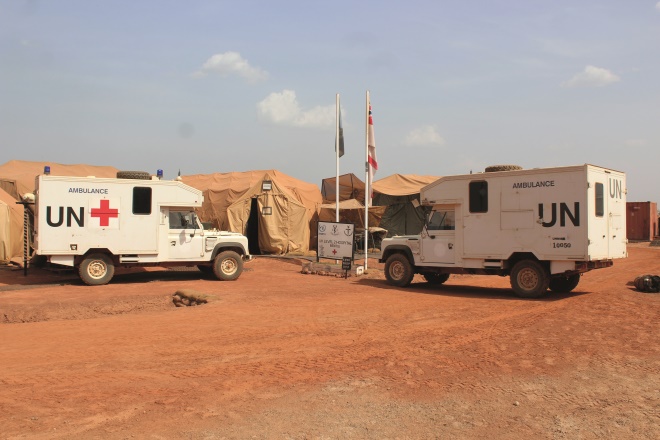
Source: Courtesy of Anuj Sunder
In this remote environment you live, eat, work and partake in exercise with your colleagues. These colleagues also overlap into the patient – healthcare professional relationship and so living with patients on a few occasions presented some challenges. I was able to keep a positive mindset throughout and lift morale of others who were finding the experience all too intense. Interestingly, I found great reward in the minimalistic lifestyle which I lived in for four months. I lived with very little possessions and the stoic routine helped me develop some further discipline.
On return to the UK it made me realise how we live a life of luxury and that that the South Sudanese people would only laugh at many of our day-to-day complaints. Overall, this experience of working as a pharmacist in such a remote and enclosed environment forced me to learn a lot about my pharmacy practice, my leadership style and myself personally, which I will carry with me into my future career.
More information
For more information about the Army Reserves visit: https://www.army.mod.uk/who-we-are/the-army-reserve/
Acknowledgments
All photographs courtesy of SAC David Zaple, Royal Air Force 4626 Aeromedical Evacuation Squadron.
I would like to take this opportunity to thank my mentors Fiona McKean, deputy chief pharmacist, New Cross Hospital, Wolverhampton; and Jane Lewis, principal pharmacist, Intensive Care, New Cross Hospital, Wolverhampton, for their support, guidance and teaching during my pharmacy career.
I would also like to pay tribute to the late, Maj Nigel Brown (RAMC), whose genuine kind nature and tireless support at the beginning of my military career will never be forgotten.
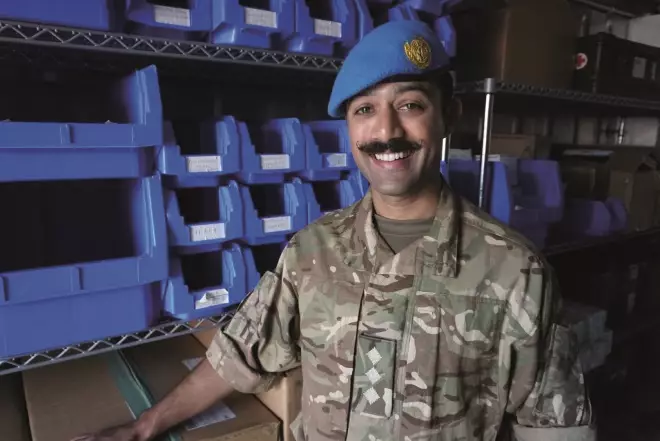
About the Author:
Anuj K. Sunder is a captain for the Royal Army Medical Corps. He graduated from Aston University in 2007 pursing a hospital pharmacy career, and later specialising in medicines information. He joined the Army Reserve in 2013 aiming to give something back to his country with the hope of giving something back to those less fortunate around the world. He is part of the Medical Operational Support Group based in York. After Sandhurst he trained abroad with the US Army’s 1141st Engineering Company in Missouri, and conducted a field hospital exercise with 1st Canadian Field Hospital in Petawawa, Canada.
You may also be interested in
The importance of diverse clinical imagery within health education

Government should consider ways to prevent ‘inappropriate overseas prescribing’ of hormone drugs, review recommends
